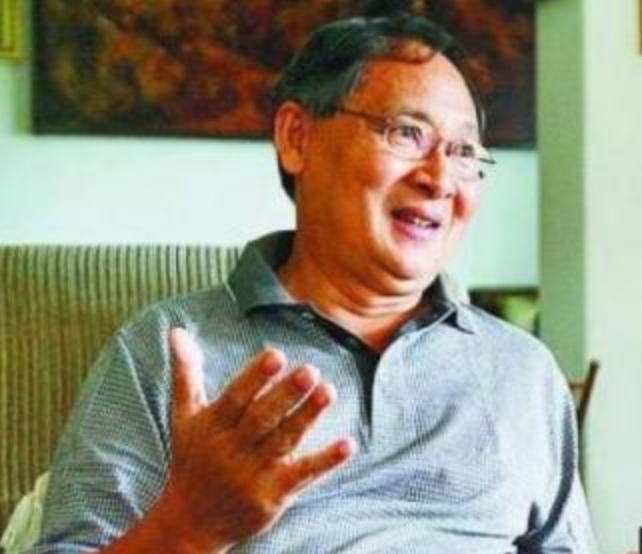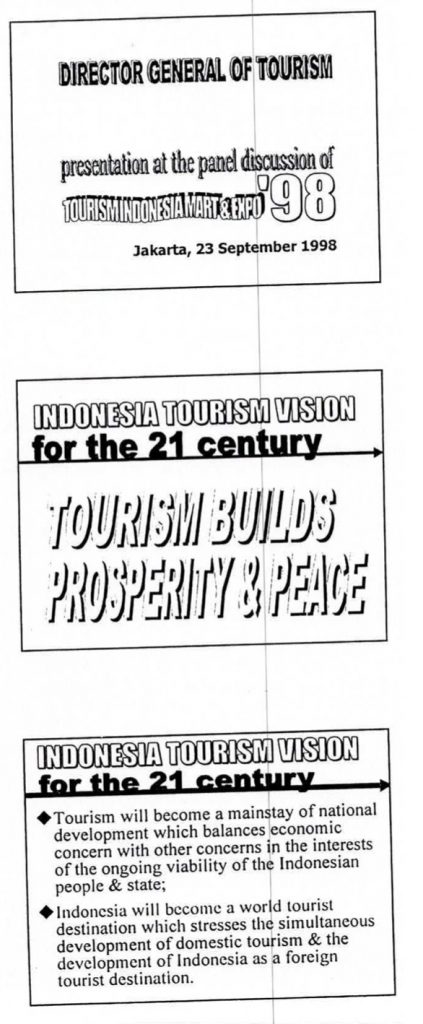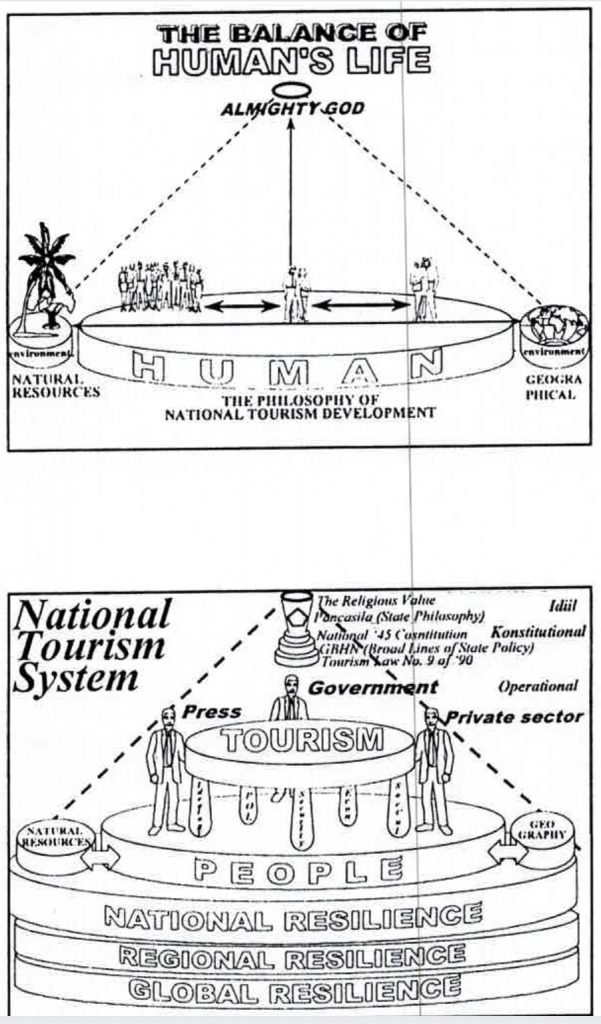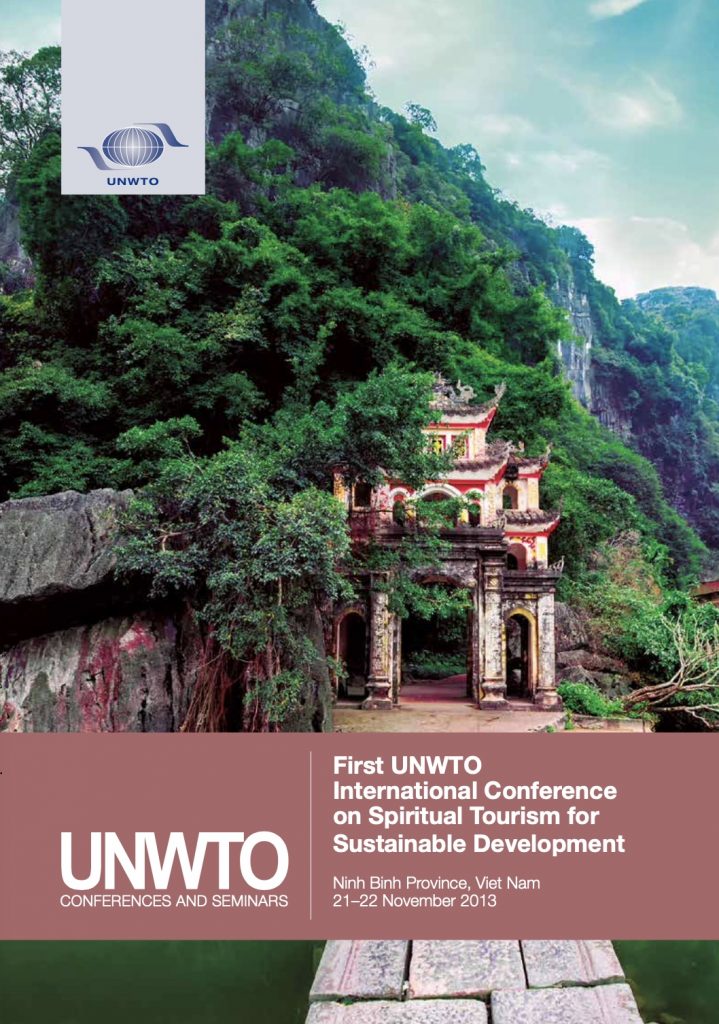
25 Feb, 2021
In Memoriam: Indonesian tourism leader who championed spirituality, balance and peace

Mr I. Gede Ardika, former Indonesian Minister of Tourism and Culture, who passed away on 20 Feb 2021, was the only leader who recognised and championed the higher purpose and value of tourism. While others saw expenditure, jobs and economic growth, Mr Ardika saw spirituality, balance and peace.
Witness these opening slides of his presentation at the Travel Indonesia Mart and Expo in 1998, when he was Director-General of Tourism.


More information about Mr Ardika’s life and times is available online. But, as Asia’s leading tourism historian, I will focus on his unique policy and philosophical outlook, rooted in his Balinese Hindu birthright.
In November 2013, Mr Ardika was invited to deliver the keynote speech at the first UNWTO International Conference on Spiritual Tourism for Sustainable Development, Ninh Binh, Vietnam. I was the only travel industry journalist to speak at the same conference.
Like all such travel industry events, the UNWTO conference generated much discussion and the all-too-familiar set of resolutions, all quickly forgotten. But Mr Ardika’s memorable speech (reproduced below in in full), is well-worth revisiting at this crucial juncture of history as a walk-the-talk basis for resetting and rebalancing the global tourism agenda.
Both his speech, and mine, can be downloaded in full here: https://www.e-unwto.org/doi/book/10.18111/9789284416738
Realistically, nothing will probably change. The bean-counting commercial and economic priorities of global tourism will still prevail. But future generations need to be reminded of those few industry leaders who tried to raise the bar, perhaps in vain. Mr Ardika was one of them.
May His Soul Rest in Peace.
Full text of keynote speech by I Gede ARDIKA
Distinguished participants, Ladies and gentlemen,
I’m honored to address in this important international conference, to share my view and my experiences. My topic is “Spirituality, Ethics and Sustainable Tourism in the 21st Century”. First, we shall observe the challenges in this 21st Century, particularly the economic growth concept. Then we refresh our knowledge on development, and sustainable tourism. Finally, we’ll see how spirituality and ethics are used as solutions in realizing sustainable tourism. (Indonesia’s experience)
Challenges in 21st Century
The biggest and serious challenges issues in the beginning of this 21st century are “global warming” and “climate change”. Global warming is caused by extensive use of un-renewable energy to accelerate the economic growth. The unconverted carbondioxide into oxygen has created the global warming effect. Global warming caused the climate change that brought serious effect on crops and agriculture. FAO has warned that climate change may cause serious crisis of food and potable water production.
Uncontrolled economic growth development has a tendency to ruin our environment and our planet. The unlimited growth concept causes over-exploitation of natural resources as well as human and financial resources. The objective of economic growth is to improve people’s prosperity. But the prosperity concept adopted is mainly on physical or material aspect or money. The success criteria are, among others, Gross Domestic Product, average income. For example, a person or community with daily income less than US$2,- is categorized as “poor”.
Many communities or countries have different moral philosophy on what is poor or rich. The quality of life is not just measured by material aspect, but it should include moral, spiritual and ethical aspects. For example, a “poor” person is somebody who doesn’t know what “enough” is. He or she always feels not enough, even though he or she has a lot of money. He or she has a tendency to be greedy. This kind of person is a “poor” person. A “rich” person is somebody who knows what enough is. A person knows how to differentiate desire and need.
Development
Development is a continuous effort to improve the quality of life of people, spiritual and physical aspects of life, to enable to set their own future. To reach that stage of life people have to pass some stages: esthetic stage, ethic stage, and religious stage or spiritual stage. Esthetic stage is when people have passed their primitivism. People are able to feel their surrounding and admire the world, interpreted in beautiful and artistic expressions, such as dances, poems, paintings etc. Ethic stage is the stage where people improve their life into human life guided by good and bad values, rooted from traditions and religions or faith. People will be qualified as human value, civilized and noble character. Religious stage is where people feel very close to their God or Creator, to reach immortality after their present life.
There are 4 implications in enabling people to set their own future. First, we have to give attention to capacity building in order to develop ability to make a change. Second, we have to give attention on equity or fairness. Third, we have to give attention on empowerment of people. Fourth, we have to give attention on sustainability of their future.
Sustainable development means, in brief, that development should be implemented reconciling the need for environment protection and effective use of resources and energy. Environmental preservation and effective energy use should coexist and be guaranteed to not only the present generation but also future generations.
Sustainable Tourism
The United Nations General Assembly in 2001, recognized the important dimension and role of tourism as a positive instrument towards the alleviation of poverty and the improvement of the quality of life for all people, its potential to make a contribution to economic and social development, especially of the developing countries, and its emergence as a vita l force for the promotion of international understanding, peace and prosperity.
The UN General Assembly also stated that The Global Code of Ethics for Tourism, which outlines principles to guide tourism development, serves as a frame of reference for the different stakeholders in the tourism sector, with the objective of minimizing the negative impact of tourism on environment and on cultural heritage while maximizing the benefits of tourism in promoting sustainable development and poverty alleviation as well as understanding among nations;
Basic conditions for “sustainable tourism”:
1. Tourism should contribute continuously to socio-economic development, and tourism resources exist to satisfy tourists.
2. Activities in tourism should not cause irreversible damage to the natural, historical and socio-cultural environment.
3. Activities in tourism should not waste the limited energy and resources.
In conjunction with the 10th meeting of the World Committee on Tourism Ethics, the Ministry of Culture and Tourism of Indonesia and the UNWTO organized a Seminar on Tourism Ethics for Asia and the Pacific: Responsible Tourism and its Socio – Economic Impact on Local Communities, in Bali on 11 June 2011, with a view to implementing Responsible and Sustainable Tourism Development for poverty alleviation, public welfare and prosperity.
This seminar produced “The Bali Spirit” as an appeal. Many countries are increasingly developing tourism as part of their national development strategies as an effective driver of economic growth and development, creating jobs and wellbeing for communities. In its implementation, tourism development faces numerous challenges and obstacles rooted in the lack of applications of values, norms, and ethics. Implementing The Global Code of Ethics for Tourism is an effective way to realize Responsible and Sustainable Tourism.
Ladies and gentlemen,
Spirituality, Ethics (Indonesia’s experience)
Spirituality covers two main areas. First, it is related to or affects the human spirit as opposed to material or physical things. Second, it is related to religion or religious belief. Ethics is the moral principles governing or influencing conduct.
Values, norms and ethics are playing fundamental role in sustainable tourism development in Indonesia. They are integrated into Indonesia’s Tourism Law and automatically have a binding power.
The Principles of Indonesia’s Tourism Development
A principle is a fundamental truth or basic rule serving as the foundation for action.
The principles development of Indonesia’s tourism, are among others:
First. Uphold religious norms and cultural values as the embodiment of the concept of living in balance: the relationship between man and God the Almighty, the relationship amongst humans, and the relationship between humans and environment.
Second. Comply with the Global Code of Ethics for Tourism and international agreements in tourism sector. The concept of living in balance, also called the three elements of happiness, is the philosophy of Indonesia Tourism.
The balance of life philosophy is defined as:
a. Balanced relations between human beings and God (Creator);
b. Balanced relations among human beings themselves;
c. Balanced relations between human beings and their natural environment.
Those values actually are universal values. They could be found in any religion. The relationship with God means that religious values guide the daily life of the people.
Those spiritual values are reflected in their way of thinking and behavior. The belief in God is reflected in attractive ceremonies, beautiful mosques, churches, temples or other forms of works. People believe that the universe, the world, human beings, and nature were created by God (Creator), and each of His creations has the same right to life. For that reason all God’s creations must be respected and loved by the people.
They should be able to keep good relations, good understanding and respect for each other, either in the form of individual relations or individual relations with their own community or a community with other communities or nations. Those relationships will contribute to creating a peaceful world. A traditional or local community consists of a group of people that have economic and socio-cultural relationships with their motherland and have values and traditions that they received from their ancestors.
People respect and love their environment because they realize that besides the fact that the environment was created by God, their lives are quite dependent on the environment.
The essence of this philosophy is the ability of people to control their desires. People must differentiate between ‘needs’ and ‘desires’. Uncontrolled desires are greed. The rich man is somebody who knows what ‘enough’ is. The poor man is somebody who never knows what ‘enough’ is. Mahatma Gandhi said: ‘There is a sufficiency in the world for man’s need, but not for man’s greed’. Based on this philosophy, tourism development has the ‘carrying capacity’ concept. There should be ‘a limit’ in development. This carrying capacity is caused by the scarcity of space, natural resources (water, air, forest, flora and fauna). Carrying capacity concept is how to reconcile the need of tourism development in an enough concept and the limitation of space, natural and socio-cultural resources to fulfill the present need as well as future generations.
The global Code of Ethics is the frame of reference for the stake holders in tourism industry to realize sustainable tourism. The code which is directly related to this topic is as follows:
• Tourism is a vehicle for individual and collective fulfillment;
Tourism, the activity most frequently associated with rest and relaxation, sport and access to culture and nature, should be planned and practiced as a privileged means of individual and collective fulfillment; when practised with sufficiently open mind, it is an irreplaceable factor of self-education, mutual tolerance and for learning about the legitimate differences between peoples and culture and their diversity.
The objectives of tourists nowadays, travel is not just for leisure, but to improve the quality of their lives.
• Tourism is a factor of sustainable development;
All forms of tourism development that are conducive to saving rare and precious resources, in particular water and energy, as well as avoiding so far as possible waste production should be given priority and encouraged by national, regional and local public authorities.
Indonesia tourism development used the philosophy “Balance of Life” as core value, and The Global Code of Ethics for Tourism as operational values in realizing sustainable tourism development.
Ladies and gentlemen,
Bali is Spiritual Tourism Destination.
The Island of Bali, as a tourist destination, is known as the “Island of God”, “Island of a Thousand Temples”. Those brands have been given by the visitors. Balinese culture, traditions inspired by Hinduism, is unique in the world.
Typologically Bali is a small island with limited natural resources but rich in culture.
The Balinese culture embodies ethical values, behavioral attitudes and physical dimensions. The culture is a reflection of pre-historic, traditional and modern civilizations. The synergies of those civilizations and Hinduism have created a unique culture and local wisdoms. Among those local wisdoms, inspired by Hinduism, is Tri Hita Korona. Tri Hita Korona is the three elements of happiness, a concept of harmony and balance of life. Happiness of human being can be defined as balanced relations of parahyangan (relations with God), pawongan (relations with other people), palemahan (with natural environment). This principle is reflected in the harmony of their lives at the micro, middle, and macro level. Disharmony will end in disorder, destruction and alienation from social life and nature. The ultimate goal of Balinese life is spiritual harmony, peacefulness and physical prosperity.
In order to be able to maintain this harmony is, among others, to hold a ‘ceremony’.
That is why in Balinese life almost every instance is reflected in various ceremonies.
There are three kinds of ceremonies, simple ceremonies, medium ceremonies, big ceremonies. The most important factor in a ceremony is its sincerity in offering, not the size of the ceremony. A luxurious ceremony has no meaning if it lacks sincerity.
This value of a ceremony lies in its sincerity.
Nowadays Bali is facing considerable challenges of modernization that also affect life styles by introducing new paradigms as well as new values. This modern life style is measured by material or physical value. It is guided by money, material or physical achievements whereas spiritual values such as honesty, good conduct of life and morals have almost vanished.
This pressure has caused conflicting situations between the ‘traditional way of life’ and the ‘modern way of life’. Ecological transformations have been caused by uncontrolled land-use practices. Economic transformation has been caused by the shift from agricultural to industrial economy. Demographic transformation has been caused by the high and heterogeneous density of the population. Transformation in information has been caused by new technologies in information that enable the Balinese to have contacts on a local, national and international level. All those transformations have put pressure on the socio-cultural life of the Balinese and could also bring about an evolutionary process affecting Balinese culture.
In response to all those challenges the Balinese have retained their traditional values as a way of life, in particular Tri Hita Karana. In conjunction with ecology as an expression of harmony, respect and love of the environment, ceremonies are dedicated to all plants and animals, especially domesticated ones. This traditional ceremony is called tumpek which is held every 6 months (according to the Balinese calendar). Tumpek Uduh or Tumpek Wariga is a traditional ceremony dedicated to all plants. On that occasion the offering consists of porridge. Tumpek Andang or Tumpek Uye is a traditional ceremony dedicated to all animals, especially the domesticated ones.
The purpose of offerings is to worship God, appreciate all plants and animals and respect their sustainability. Such ceremonies are held all over Bali. Some trees are treated like ‘human beings’ by ‘dressing’ them in white and yellow clothes or black and white checked cloths wrapped around the trees. Sometimes a pair of umbrellas is also put beside them. This is regarded as a symbol for the equality of human beings and trees as God’s creations. Some people hold the wrong belief that the Balinese believe in tree spirits instead of God.
In entering the 21st Century, Bali as an international tourism destination is enhancing the dimension of spirituality and ethics. Mass tourism development approach is being transformed into quality tourism approach (enough based approach). Culture based, community based, and environment based development is being extensively implemented.
Thank you.




Liked this article? Share it!